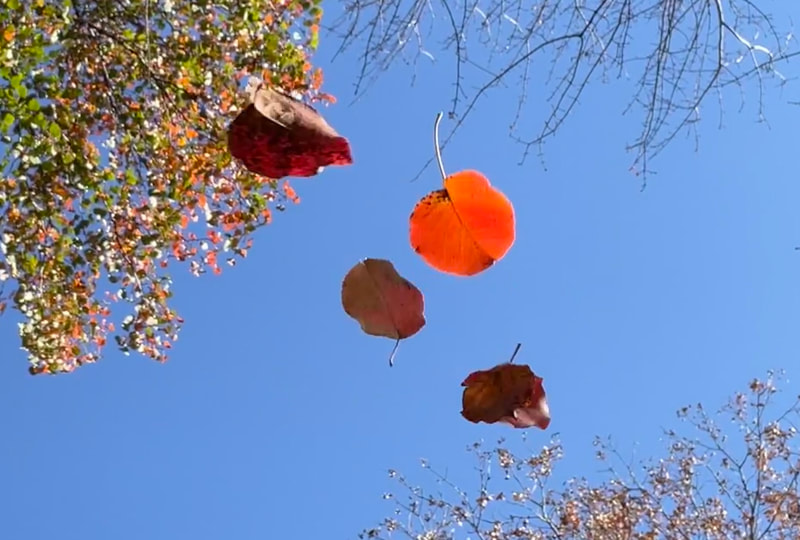(Anais Nin)
|
Looking back a couple of years, I came upon this post that I made regarding my then-impending retirement. It's interesting to see the things that led to that decision and how things have progressed in the last two years - both in my former school and in the politics of many schools I have visited in my position as supervisor of student teachers for Pittsburg State University in Kansas. We've been talking about my retirement, but up until now, I've only been 99.9999999% certain that it would happen at the end of this school year. Prior to the pre-school district-level meetings in August of 2021, I had imagined serving two more years following this one. That quickly took a nose-dive when I realized the return to many of the issues that burned me out one time before. I don't want to dislike my job, so it's time to leave while I still enjoy things.
I became eligible to retire a couple of years ago, but I simply figured I could stick with it for a while longer - just because I still have a passion for the profession and for my fourth graders. I didn't feel I had perfected the craft, and I longed for continuing chances to do so. There are so many areas that I can still improve. But here we go: I am officially announcing the plan to leave the classroom that has served as a second home for 27 years. With 32 years under the belt, I am hanging up my chalk. That doesn't mean that I'm leaving town, though, and it does not mean that I won't be involved in education. I am exploring opportunities to do public speaking and consulting in the field, as well as conduct professional development and work with elementary education majors in local colleges and universities. Additionally, I will maintain a relationship with the Gilder Lehrman Institute of American History, which has named me a master teacher. I will have more time available if a temporary, contracted job should open up with the institute. I can also write more books - both fiction and nonfiction, and I can serve the church more - both as a preacher and in the development of new materials and media. Of course, I will continue to donate plasma off and on, as well as get some more outdoor time around the house and exercise around the neighborhood. With one child off to college in 2022 and another entering junior high, there is always a need for earning some extra cash, so if anyone knows of any high-paying jobs that don't require special knowledge or skills beyond fourth grade, where I have spent a large portion of my life, please let me know about them. I could use all the help I can get. Originally posted July 30, 2016  I remember it distinctly. My parents, in reference to their involvement in the church's Vacation School, expressed their distaste for calling the participants kids. Kids are baby goats, you understand, and it is degrading to refer to children by such a derogatory term. I get it. I was a child myself. To think that children could be labeled by the same name as a baby goat! Just imagine. Didn't those people understand that goats are noisy, filthy creatures that chew on everything in sight? On second thought, that actually kind of explains things, doesn't it? But now they've gone too far! They're no longer calling children kids; now they're calling them kiddos. And it doesn't make sense. Why add the extra syllable? It certainly doesn't save time to call them that, so I suspect that people are just trying to be cute...or should I say cutesy? How do things like this spread? My own children's teachers, from kindergarten to sixth grade, call them kiddos, and don't think I'm not tracking it. How long will it last? Into junior high? High school? I guess it could be more worser: they could be calling them kiddies instead. But again, I ask you, Why? Why add the extra o? Do we do that to other words? We don't call them childos or boyos and girlos, do we? Of course not. Kiddos sounds more like a breakfast cereal of which mothers would disapprove. Kid-Os cereal would most definitely have bits of chocolate and marshmallows. You see, that's what we do to these students. We give them sugar instead of vitamins. I would much rather their own answers to me be robust and full of lasting energy, not empty fat. Just think about it. Words mean something, and if we're just saying it out of habit and to be silly and cute, that alone is good reason for cutting it out of our vocabulary. How can we show more respect to our students? At the same time, I hear teachers in videos calling their prodigies young scholars instead. Honestly, I'd rather hear kiddo than young scholar. It's not sugary, but it does seem forced. Fake. And it's sure to get some behind-the-back razzing from students. Others refer to their four- and five-year-olds as kinders and littles, which is more than a little cutesy for my taste. While we're at it, won't you please stop referring to your husbands as hubs on the Facebook. What do you call your children? Have you given it conscious thought? Or do you do so strictly out of habit? "Wise men speak because
they have something to say; fools because they have to say something." (Plato) My sermon based on Matthew 1:1 begins at 29:36 in this video: "Blessed is the man, who having nothing to say, abstains from giving wordy evidence of the fact." (George Eliot)
For me, Shannon Springs holds a special place in memory. I would frequent this park to do some reading or studying when I attended nearby University of Science and Arts of Oklahoma in the 1980s. I would often cross that bridge (sans lights) to watch waterfowl and enjoy some time away from classes. Sometimes it's a good idea to rekindle the old memories - and even to share them with loved ones.
One additional note about Shannon Springs includes the fact that I named a fictional town after this park in the book, Chippin Cleats. It is the story of a who finds his way out of the gang life in the streets of St. Louis in an unlikely place, hours away from home. That book is available for purchase on through Amazon. Originally posted July 14, 2016  You've got to stop...stopping, that is. In a self-contained classroom, I have a great deal of say over when we learn what. And I cannot allow a set schedule to get in the way. Just because the hour has ended, and the schedule dictates a change in subject, does not mean you have to stop. How many times have you dug into a lesson - really gotten your students engaged in something - and stopped because the clock screamed at you? Stop it. Take that "teachable moment" and run with it. I've been known to stick with a lesson for hours, even for an entire day, because I'm smart enough to know what's working for my students. Yes, I hear you. An administrator can be so controlling and heavy-handed that s/he will not permit you the professional respect you need to make decisions for your class. Some would have you teach the same thing at the same time as your grade level peers. They want to see you on the same page and teaching in the same manner. I don't wish to sound aggressive, but I will fight that concept. Who knows my classroom, might students, and my style better than I do? If it is a teacher's contractual duty to teach students, then any administrator worth his/her salt will respectfully allow the teachers in the building to teach. That includes this preposterous idea that a teacher should understand best what to do in the classroom. My friends, we are the tip of the spear. We are the ones on the front lines in the war against ignorance. Are any more military metaphors needed here, or are we getting the idea? In contrast, I need the ability to shut down a lesson that isn't working. We've all had lessons that have fallen flat. Did we keep marching forward in failure? Or did we have the common sense to wave the white flag of surrender? We must know when to retreat from failure. Oh, we can still learn from the failed lesson, change it on the fly, and keep trying, or we could change the lesson altogether and try again tomorrow - but we have to be able to make changes in our schedules as the days progress. Don't tie yourself to the schedule. Stop stopping when the bell tolls. Exercise that famous flexibility we always hear about in our field. Make this thing work for your students! And you administrators, remember the greatest tool you have in your belt is to empower your teachers. They should know better than you what they're students need. Be their resource for support and advice, but grant them the professionalism they so desire. "Words that soak into your ears
are whispered, not yelled." (Unknown)  1 Thessalonians 5:11-18: “Therefore, encourage one another and build one another up, just as you also are doing. But we ask you, brothers and sisters, to recognize those who diligently labor among you and are in leadership over you in the Lord, and give you instruction, and that you regard them very highly in love because of their work. Live in peace with one another. We urge you, brothers and sisters, admonish the unruly, encourage the fainthearted, help the weak, be patient with everyone. See that no one repays another with evil for evil, but always seek what is good for one another and for all people. Rejoice always, pray without ceasing, in everything give thanks; for this is the will of God for you in Christ Jesus.” In what circumstances does Paul say we don’t have to give thanks? In this passage, who gives thanks? Who gets thanked? How can we learn to give thanks to God for the hard stuff? There is power in affirming words and there are two parties involved in showing appreciation - the one who says thank you and the one who has done something worthy of it. Good manners aren’t taught any more in school, and yet they are expected. I came to understand that and did something about it in my classroom until my class was noted by the principal as being the “most family-like class in all of Joplin Schools”. I wish you could have seen it. They could yield to each other in conversation. They could allow others to go ahead of them in line. They said excuse me, please, I’m sorry, and thank you as a habit. It really was remarkable. I don’t know why the corporate world calls these "soft skills". They are not soft, and doing them doesn’t make one soft. I found an encouraging video online and showed it to my classes at opportune times. It was called Street Compliments. Somewhere in the U.S., as a little test of the human spirit, the makers of the video placed a booth and a giant pair of headphones on the sidewalk and invited pairs of people to take their places - one in the booth to speak into a microphone and the other to sit beneath the headphones and listen. My fourth graders watched as one of each pair entered the booth to tell the other of the pair how they felt about him or her. Remember, there are two parties involved in showing appreciation. One pair was a boss and an employee. Another was a mother and grown daughter. Another was a younger daughter and her dad. Another pair was a couple who had been married for a year and a half. Each entered the booth and poured out words that they would not have shared if not for this experiment on the sidewalk. The grown daughter told her mother how much she admired her mom’s ability to break into song. She thanked her for putting music in her life. When it was her turn, her mother told her how easy she made it to be her mother. On and on, each pair shared such personal thoughts of appreciation. Some came in the form of compliments. The next day, after seeing how this was done, students came to the classroom to find two chairs facing each other in the center of the classroom. We really worked hard to establish the skill of looking people in the eyes when talking and listening to them. A spotlight that puddled around the two chairs. When class began, I explained to the students that they would have the opportunity to do what they had seen in the video the day before: they would get the chance to say words they would otherwise never say to other people in the classroom - even to the people they wouldn’t normally associate with as close friends. They would get to say what they admire about the person. And it was beautiful. One by one, a student would volunteer and request another to sit in the second chair, and there in front of 20-25 classmates, they would pour out their hearts in the form of compliments. I always bragged to my fellow teachers about how I liked to make my students cry. We really got into the read aloud stories and would often go to lunch and assemblies with tears in our eyes. But on this occasion, the students would cry when they heard unlikely people telling them how they felt. Students would cry with the understanding that things just got lighter for them as they unloaded feelings they didn’t even realize they had. It was amazing to see them make observations about each other that some of the rest of us would never have picked up on. What do you think that exercise did for the culture of our classroom family? It reinforced all of the soft skills, the people skills, and the manners that I had emphasized from Day One. You may never have seen a classroom of ten-year-olds with these types of relationships, but I’m telling you, it made it worth my getting up in the morning…most of the time. There are two parties involved in the sharing of appreciation…and you are always one of those parties: either you are showing your appreciation to someone else, or you are accepting that gratitude from someone else. That was certainly the case in Luke 17:11-19. Here we find Jesus as He encounters another leper - actually ten lepers at once. It comes in one of those times when Jesus is going between Samaria and Galilee. You’ll recall from many occasions that the Samaritans were not on the best of terms with the Jewish people. The racism was so bad that the Jews would take a much longer route to get to Jerusalem just to avoid meeting up with a Samaritan. But here is Jesus traveling on the road that goes right through Samaria. Verse 12 says that when He entered a village, ten men with leprosy yell at Him from a distance. They aren’t allowed to get too close to someone who does not have the disease (social distancing). “Jesus, Master, have mercy on us!” they shout. And before they are healed - while they are still sloughing off skin, with bleeding and infected sores on their bodies, in danger of fingers and toes falling off - before they are healed, Jesus tells them to “Go and show yourselves to the priests.” By law they would have to prove to a priest that they no longer had leprosy, and the priest could clear them for normal activity. But Jesus tells them to go and show themselves to the priest. It takes great faith for them to head that way without any sign of the disease leaving their bodies, but they do. As they are walking that way, they are cleansed. They will once again be allowed to associate with other people. They can return to their families. They’re no longer under quarantine: they can gather in the worship assembly with others. It must be exciting for them, emotional. Maybe they engage each other in conversation as they go on their way to be approved by the priests. I imagine they show each other spots on their bodies where the leprosy used to be. They’re smiling and skipping up dust as their pace quickens. But the story of Luke 17:11-19 is not about Jesus’ power to heal leprosy. There are other examples of God’s power to heal lepers. Instead the focus on this account starts in verse 15: “Now one of them, when he saw that he had been healed, turned back, glorifying God with a loud voice, and he fell on his face at His feet, giving thanks to Him.” Ah, it takes two parties to complete a transaction of appreciation. Jesus would not have received any gratitude if the one man had not circled back. In fact, Jesus notes that fact, asking in verse 17, “Were there not ten cleansed? But the nine—where are they? Was no one found who returned to give glory to God?” Luke points this all out to show readers the great effect of being complimentary and appreciative to other people. Stop and think about every single thing that you could thank someone for. Stop and express your thank you every single time you can. Don’t think that you can say it too often. Don’t tell yourself that it doesn’t mean as much if you saturate the market with your thank yous. It will not devalue the words to use them more often. Luke also points out that the healed one who turns back to honor his Healer is a foreigner. In fact, he is the worst kind of foreigner: he is a Samaritan - a lowly race full of people who are not God’s chosen people. And yet, we hear Jesus tell him, “Stand up and go; your faith has made you well.” What about the other nine? They were made well, too. Presumably, they all went to the priests and got their certificates of cleanliness, and presumably they had great faith in Christ’s ability to heal them, too. What makes the tenth man stand apart is one simple action - a sincere thank you. Sincere enough to compel him to loudly glorify God and fall on his face at Jesus’ feet. Have you ever been recognized for hard work and achievement? How did it make you feel? Did you want to do even more? Reach greater heights? Go the extra mile? It’s encouraging, isn’t it? Have you ever had a boss who didn’t recognize when you did something, a boss who was really good at barking instructions to employees, but who rarely acknowledged their good traits? And I’m not talking about that tired, old line of “Thank you for all you do.” That’s just as generic as it goes. At school, we would often get “Thanks to all of you for all that you do.” That wasn’t motivating. It’s not the same if it’s not specific. And it’s not special if everything got the same compliment. You could certainly show gratitude to an entire group of people on a special occasion, but it means so much more when there are just two parties involved, looking each other square in the eyes. The intimacy in that moment is what motivates a person. So I would encourage you to saturate the world with your specific appreciation for what everyone does for you. Did someone open the door? Don’t walk through it without acknowledging it. Did someone let you into a crowded lane of traffic? Don’t drive on as if nothing happened. You want to make someone’s day? Pass out compliments like they are Halloween candy. And we don’t need to dwell on it, but don’t expect others to be as trained in the art of appreciation as you are. And don’t let that stop you from holding the door anyway. Before we finish, let’s acknowledge that Jesus has done more for me than He did for those ten lepers that day. Friends, it is not OK for you to thank the clerk and the salesman, the doctor and the caddie, the dry cleaner and the waitress, and ignore Jesus Himself. Romans 5:6-8 says, “For while we were still helpless, at the right time Christ died for the ungodly. For one will hardly die for a righteous person; though perhaps for the good person someone would even dare to die. But God demonstrates His own love toward us, in that while we were still sinners, Christ died for us.” If you don’t mention your appreciation for that, you are sadly ungrateful. And you’ll hear Him behind you as He says, Didn’t I die for everyone? Where are the rest to show their appreciation? Why aren’t the rest glorifying God? It’s such a simple thing that we forget to do. Please, don’t get so wrapped up in other things - don’t even get tied up in your own celebration of being saved - that you forget to tell Him thank you.  1 Peter 4:9: “Be hospitable to one another without complaint.” Is all of this hard for us sometimes? If so, why? Are we afraid to get too close to individuals? If so, why? Are we afraid of letting other people into our lives? If so, why? Are we afraid of being open and authentic with people? If so, why? Many of us would consider ourselves to be introverts. Some of us even wear that label proudly. We tell others that’s the way we are, and there’s no changing us. The problem with that is that it’s not completely true. There are certain personality traits that we inherit or develop, but that doesn’t always give us the excuse to give up trying. Growing up, every year, before school began in August, I would have a talk with God about bringing me out of my shell. You see, I have always found it comfortable getting up in front of a crowd of people, acting and singing in plays and delivering speeches - the larger the crowd, the better - but to talk one-on-one or in a small group has always been a struggle for me. To this day, I don’t know how I got to where I am. Because of my introverted personality and an awkwardness with small talk, I was not so good at dating. You want to hear the saddest story ever told? I strongly dislike telephones. I would rather drive across town to talk to somebody in person than pick up the phone to call them. I think there’s something about talking to a person and not being able to see their nonverbal communication that makes me a bit paranoid. No one likes going to get fast food with me, because I won’t go through the drive-through. It probably stems from when I was a teenager. At night, in my bedroom, I would rehearse my side of a phone call to a girl. I would go over every possible outcome, every answer she might give to my questions. I practiced my reactions, experimented with various inflections, and put words together in rhythmic sentences. I wanted to be ready! You’ll be pleased to know that, one time I made the call. I padded to the wall phone and deftly dialed the seven digits of a girl’s phone number. The girl herself answered, and we had a conversation! Right there on the telephone! I talked to her. She knew who I was and everything, and I took the plunge and asked her out. Everything about that phone call is blurry. This was a slim redhead with a smile that lit up every room she entered. I promise that’s all I remember about her. I can’t even think of her name. It was a long shot that she would ever accept an invitation from me, but I had just popped the question - Would you like to go out sometime? - and she has just responded: “Sure. It would be fun.” What did she say? Did she say yes? “OK,” I stammered. “I’ll talk to you in class, and we can make plans.” And I never…talked…to her…again. We were in the same class. We saw each other every day. But I never said another word to her. She must have wondered if it was really me on the phone - or maybe she had misunderstood and thought she had made a date with someone else. For all I know, she never got married and is still sitting at home waiting for me to call her back. Sadly, I still do a bit of rehearsing before initiating a phone call. It’s frustrating to say the least. There’s another story to be told - about the first date with my wife. I was with another girl who insisted on picking up my future wife and her date. We were just going to an areawide singing at a congregation on the other side of Oklahoma City, but I wasn’t happy that this other couple was sitting in the back seat of my car. Plus, I had to meet the other girl’s parents (and the dad was a little on the intimidating side). Since getting some alone time to get to know my date better, I decided I wasn’t going to spend any more time or money on this occasion than necessary. We went to Hardee’s before going on to the singing. At Hardee’s, this other girl (who is somehow now my wife of nearly 32 years) was so immature. She was pulling my date down with her. I don’t remember if the cowboy she was with ever said or did anything to help either. It was so frustrating. And to top it off, her perception of me wasn’t any better. Because I was quiet, she thought I was stuck up - which was not the case, but what did I care? I wasn’t ever going to pursue a lasting relationship with her anyway! I say that to say this: sometimes we hold back or we are not authentic, because we want to keep ourselves safe. We keep things on the surface and superficial. Not just with our dating relationships (Most of us here don’t have dating relationships anymore.), but with neighbors, coworkers, friends, and even family members. We don’t like when others see us misstep. Think about the last time you tripped: the first thing you did was look around to see if anybody witnessed the accident. Think about the last time you walked into a spider web: the first thing you did was look around to see if anyone saw you flailing ridiculously. Why? Because none of us wants to be embarrassed. We don’t like when people see our weaknesses. We don’t like when people catch us in our mistakes. We don’t like when other people see us being less than perfect. We don’t like when they witness our sin. In teaching, I never wanted the principal to observe me unless I was at the top of my game. But later in my career, I discovered that there is comfort in having the type of relationship where it is OK for the other person to see my flaws. It is OK to be vulnerable. Those are the times when growth occurs the most - when we stop trying to project a false image and we let our guards down with each other. It also allows the other person to open up to us. When we are vulnerable, sharing our stories and struggles with people, it sends a message of humility and offers the opportunity to serve one another. Speaking of one another, every time the phrase appears in the New Testament, it is a risky way of saying that vulnerability is the acceptable manner in which rich, Christian relationships are formed. In this, God asks us to take risks. Consider the risks involved by all parties in these one another passages:
We must stop trying to be the beginning and end to everything: that’s God’s identity, not ours. We must not be perceived as know-it-alls. We need to admit our flaws and understand that it is OK, while at the same time understanding that our flaws do not give us excuses to remain flawed. It’s simply not all right to say, “I was born this way,” “This is the way God made me,” or “I’m just being myself. This is who I am. Take it or leave it.” It is never OK to tell others that they must accept you just as you are. Even when we sing that song, Just as I Am, what do you think we are singing? Just as I am—without one plea, But that Thy blood was shed for me, And that Thou bid’st me come to Thee, O Lamb of God, I come, I come. That’s not an expression that says, “Come as you are and you’ll be accepted as you are.” Those words are an admission that we are called to be more than we are. Just as I am—and waiting not To rid my soul of one dark blot, To Thee whose blood can cleanse each spot, O Lamb of God, I come, I come. That doesn’t say, “This is the way God made me, and you have to accept me this way.” It is an admission of fault and an expression that I cannot clean myself; only the blood of Jesus can do so. Just as I am—though tossed about With many a conflict, many a doubt, With fears within, and foes without, O Lamb of God, I come, I come. Just as I am—poor, wretched, blind; Sight, riches, healing of the mind, Yea, all I need in Thee to find, O Lamb of God, I come, I come. When we sing these verses, we do not challenge one another to overlook our issues. Instead, we are singing our vulnerabilities. We say that we have problems and that we must somehow contact the blood of Jesus and heal. And because we approach the Savior, there is relief in sight. Just as I am—Thou wilt receive, Wilt welcome, pardon, cleanse, relieve; Because Thy promise I believe-- O Lamb of God, I come, I come. Just as I am—Thy love unknown Hath broken every barrier down; Now, to be Thine, yea, Thine alone, O Lamb of God, I come, I come. We come to Jesus “just as we are” - and we bring others to Him “just as they are” - with all of our flaws and faults, all of our shortcomings and sin. We lay ourselves bare at the foot of His cross. And we expect a change! We come “just as we are”, but we expect - with hope - that we will leave as new, forgiven, children of God. Because of the Lamb of God, Jesus, we replace the dingy, dirty, itchy, smelly garments with pure, soft, white, comfortable robes.
Last time, we learned that we should open ourselves up to love others. This week, we see some of the things that this entails - namely an acceptance that we are flawed, but a willingness to change with the help of one another. We are the family of God, ready to grow the church through our own love for each other and our growing ability to accept that we’re not the only flawed people in the neighborhood.  I have been recruited to serve with the Gilder Lehrman Institute of American History once again in 2024. Two years ago, I led GLI's summer History Camp for kids in the middle grades as we virtually visited National Parks for six weeks. Last year, I was the Master Teacher for the summer teacher seminar about Colonial America, working with historian and two-time Pulitzer Prize recipient Alan Taylor. This year, I will serve in the same capacity for the new seminar for teachers, American Environmental History, with Professor Catherine McNeur of Portland State University. This should be an interesting discussion about, among other topics, horses and pigs producing waste in the streets of antebellum New York City. Now there's a topic you can really sink your teeth into...but don't, because, you know, it would be disgusting. "Because things are the way they are,
things will not stay the way they are.” Bertolt Brecht Originally posted November 28, 2014, following racially-charged riots in response to the death of a man On the other side of our state sits a small suburb named Ferguson. At little more than six square miles, and at less than half the official population of Joplin, Ferguson may sound like a small town - and indeed it is - but a quick look at a map shows it as a part of the St. Louis metropolitan area. Ferguson is small in area and population, and it appears somewhat uniform with other suburbs, with similar amenities and cookie-cutter houses and store fronts that could just as easily appear in Anytown, USA, but Ferguson does not boast of a small-town atmosphere.
In 1990, more than 70% of the citizens of Ferguson were white, with around 30% black. Now, 24 years later, those demographics have nearly reversed. Such a quick transition may be a contributor to the current events where a police officer shot and killed an 18-year-old. I don't pretend to know everything about the situation, and I don't need to go into details or posit any opinions, but there are some things we can learn. What Do Recent Events In Ferguson Show Us?
There are times when we give up hope. Those are the times when we want to close ourselves off to anyone who is not like us, anyone who does not share our religion, our sense of humor, or our skin color. We begin to think we could be better off living alone in the wilderness, off the grid. Maybe when we see life through the prism of our televisions, we do not see as clearly as when we observe life through our own eyes and even vicariously through the eyes of others (empathy). We must not assume to know how someone else feels, acts, or reacts, but we must always be prepared to feel, act, and react appropriately for ourselves. Our classroom is just one place to learn and practice. May Ferguson, Missouri, serve to remind us, warn us, and educate us about ourselves.
|
AnthemThe Hoggatteer Revolution
is an extensive, award-winning, inimitable, digital platform for Encouraging and Developing the Arts, Sciences, and honest Christianity in the beautiful, friendly LAND OF THE FREE AND THE HOME OF THE BRAVE This site is described as
"a fantastic site... chockablock full of interesting ideas, hilarious anecdotes, and useful resources." 
...to like, bookmark, pin,
tweet, and share about the site... and check in regularly for new material, posted often before DAWN'S EARLY LIGHT! History in ResidenceElementary Schools: Bring Mr. Hoggatt into your classroom for a week of engaging and rigorous history programming with your students. LEARN MORE BUILDING BETTER
|

















































